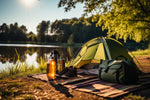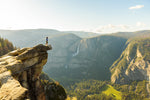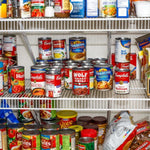Patrick Kelley
Top 5 Beginner Camping Mistakes To Avoid
Camping is a fun and exciting activity that you can practice in several ways. You can do it alone, with friends or family. You can do it on a weekend or disappear into the wilderness for a couple of weeks. No matter how you choose to go about it, bedding down in the middle of nature could be a soul-enriching experience.
However, a camping excursion could also turn into a horrible nightmare if you do not take it seriously. Living in the hinterland even for just a few days is a completely different experience than your regular city life. Such an expedition requires plenty of preparation, especially if you are doing it for the first time.
If you don't want your trip to turn into a memory-scaring event, you should plan and avoid the five most common camping mistakes below!
1. Bringing the Wrong Camping Equipment
The first and most notable mistake that first-time campers make is bringing the wrong equipment. An unsuitable tent, thin sleeping bags, and no camp bed are just a few of the most common mishaps that you may only acknowledge after spending a freezing night in the woods.
In the wilderness, temperatures can drop massively during the night. You will need a reliable tent that keeps the cold wind and potential rain outside. Your biggest investment should go into it, as well as into other insulation camping gear, such as a thick sleeping bag, an inflatable camp bed, and a high-performance air pump.
Here is a camping equipment checklist that should help you prepare your trip better:
- Sleeping bag
- Pillow
- Sleeping mat or camp bed if tent camping
- Table and camping chairs
- Mallet, spare pegs, and puller
- Spare batteries, portable charger, and cables
- Torch and head torch
- Tent repair kit, paracord, cable ties, sewing kit
- Air pump if needed for an airbed
- Windbreak
Having a sturdy, reliable shelter that keeps you warm and cozy is a must-have for every camper out there. Remember that in the wild, you do not have access to heating, electricity, running water, or repair shops. You will have to set up a comfortable camp and have backups for every item in it.
2. Bringing the Wrong Food
Now that you have figured out your shelter, it is time to consider another vital element of a successful first camping trip: food.
Many beginner campers make the mistake of bringing the same food on a camping adventure that they would frequently eat at home. The problem is that in the wilderness, you cannot survive on frozen pizza, microwave popcorn, and uncooked pasta. Also, the nearest supermarket or restaurant could be hundreds of miles away.
Do not bring with you any foods that require refrigeration or freezing. Leave at home perishable fruit and vegetables, raw meat, eggs, and fresh fish. Also, keep in mind that you will need plenty of potable water, so you might want to bring more water bottles instead of alcohol or sweetened beverages that will only dehydrate you.
When you pack food for your first camping trip, you should choose it upon specific criteria, such as:
- It is weather resistant.
- It is not easily perishable.
- It doesn't spoil, and it doesn't attract insects.
- It is easy and quick to cook.
- It is high in calories and protein.
Good choices for camping food include canned vegetables and fruit, MRE meals, breadsticks, peanut butter, carrots, peppers, and apples. Other essentials include instant coffee, tea, salt, condiments, and crackers.
If you have cooking equipment, you can also bring food you can cook on the spot, such as readymade soups, rice, canned meat, and potatoes. Some of the kitchen essentials that you should consider when camping include:
- Camp Stove or BBQ
- Fuel
- Lighters or matches
- A cooling box
- Pots, pans, and a kettle
- Chopping board
- Plates, bowls, and mugs
- Cooking and eating utensils
- Dishcloths and sponge
- Washing up liquid and bowl
- Garbage bags
- Tin & bottle openers
Also, you shouldn’t forget about comfort food that could improve your mood on a rainy day, such as marshmallows, chips, cookies, and chocolate.
3. Bringing Unsuitable Clothing
When you are on a camping trip, you must remain warm, hydrated, and well-fed at all times. You may have a good tent and plenty of food. However, if you are wearing the wrong clothes, your camping experience could easily become a disaster.
When you go camping in the forest, you will not need city shoes, high heels, flimsy shirts, and evening dresses. Instead, you should invest in camping gear such as:
- A pair of sturdy, waterproof boots
- Waterproof jacket, trousers, and umbrella
- Clean, dry, and warm clothes to sleep in
- Woolly hat, gloves, and sunhat
- Spare underwear and socks
- Lightweight and fast-drying bags to keep clothes in
- Sun protection and sunglasses
Remember, camping should be fun and comfortable, and not a trip on which you get sick or suffer from cold or sunburns.
4. Not Respecting the Wildlife
One of the most common camping mistakes that first-time campers make is disregarding the delicate balance present in nature. Inconsiderate actions like leaving plastic or rubbish behind, feeding wild animals, or killing plants and insects are sure ways of destroying precious habitats.
When you are in the wilderness, you have to respect the environment and do your best to have a minimal impact. In this regard, you should consider the substances that you bring along, and which may harm the wildlife, such as chemical bug spray and toxic fuels that could cause irreversible damage to the natural habitat.
5. Preparing Everything at the Last Minute
Most beginner campers fall into the trap of leaving preparation for the last minute. Somehow, they mistake camping in the wild with vacationing in a populated resort where everything is a paid service with satisfaction guaranteed.
When you go camping, you have to plan at least two weeks before departing. After deciding the destination, you should:
- Check the weather forecast for the entire duration of the trip.
- Finalize booking details and any tickets if necessary.
- Take up travel insurance.
- Breakdown cover details for the trip.
- Acquire contact details of the nearest vet if necessary
- Do a thorough checklist of all the necessary camping equipment, clothes, and food.
- Make a stock of all the medication, toiletries, and first aid kit essentials that you will bring along. Having a first aid kit is essential.
Finally, research the area where you will travel to, and try to understand if there are any environmental restrictions, dangers, or seasonal regulations.
Remember that going on a camping trip can be a sensational experience and a lifelong, pleasant memory only if you thoroughly prepare ahead for it. Hopefully this article has better prepared you for your next camping trip!
To learn about more Camping Mistakes To Avoid, check out this article!
Image from Gear Junkie
Share on:









